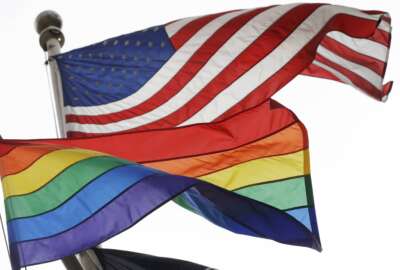Military members in same-sex marriages set for better coverage of infertility treatments
DoD will update its policy for coverage of infertility treatments, giving access to active-duty members who are either unmarried or in same-sex marriages.
Military members looking to expand their families will soon have better access to infertility treatments through TRICARE, the Defense Department’s health insurance program.
DoD plans to update TRICARE’s policy for coverage of in vitro fertilization (IVF) procedures, in effect giving access to active-duty members who are either unmarried or in same-sex marriages.
The policy change comes in response to a 2023 lawsuit alleging DoD’s policy on IVF coverage through TRICARE is discriminatory and offers very narrow access to the treatments. DoD’s current policy only covers legally married service members who are able to provide their own sperm and eggs for the procedure — or in other words, married couples of opposite sexes.
In practice, that policy excludes LGBTQ+ members, as well as unmarried members, from accessing the infertility treatment, according to the National Organization for Women–New York City (NOW-NYC), which first filed the lawsuit in August 2023. The Yale Law School is representing NOW-NYC in the suit. Sonia Ossorio, executive director of NOW-NYC, called DoD’s planned policy update in response to the lawsuit a “big win.”
“This is going to be so meaningful to our active military members who have been denied access to IVF treatments,” Ossorio said in an interview with Federal News Network. “This is a really big day for the military, for the Department of Defense, to recognize this and to change these policies. Up until now, you could not apply to get IVF treatment covered if you are in a same-sex marriage, even eight years after the Supreme Court made same sex marriage legal. It did not add up.”
DoD will soon end the current requirement for members to be married to qualify for IVF coverage. The department also intends to remove the current ban on the use of donor eggs and donor sperm for service members insured through TRICARE to get IVF covered. The DoD policy, as it was originally written, would still not allow members to qualify for IVF coverage even if they paid for donor sperm and donor eggs out of their own pocket.
The limitations made it extremely difficult for active-duty service members and those who get their care through TRICARE to get access to infertility treatments, said Barbara Collura, president and CEO of non-profit advocacy group the National Infertility Association.
“This is going to help more people get care and build their family, and I take that as a win,” Collura said in an interview with Federal News Network. “How many? I don’t know. But if it’s one, if it’s 10, if it’s 100, that’s a win. That’s another family that has the opportunity to build their family and get their care where they should be getting it, in this case from DoD.”
DoD is expected to formalize the policy changes by the end of February and provide further details at that time, according to a Dec. 26 court document. At that point, DoD will begin formally implementing the policy changes.
Ossorio said despite the positive change, there is still more work ahead. The August lawsuit is not limited only to DoD or active-duty military members enrolled in TRICARE. NOW-NYC additionally filed a lawsuit against the Department of Veterans Affairs, saying the VA’s policy for IVF coverage similarly precludes unmarried veterans and those in same-sex marriages.
“This is really a big victory, but we’re only halfway there,” Ossorio said. “We need the VA to recognize this policy and do the same thing that the Department of Defense has done.”
Although VA has not announced any changes to its current IVF coverage, VA Press Secretary Terrence Hayes said the department will continue to review potential changes to its policy. It will take into account the changes to DoD’s policy, since the legal authority governing VA makes DoD’s policy change relevant to VA’s policy as well.
“While we do not comment on ongoing litigation, one of VA’s top priorities is to provide needed reproductive health care to veterans — and we continue to strongly advocate for expanded access to assistive reproductive therapies, including in-vitro fertilization, for single veterans, those in same-sex relationships and those who need donor gametes and/or embryos to build their families,” Hayes said in an email to Federal News Network.
VA does provide certain fertility treatments to veterans enrolled in the VA health care system, such as assessments and counseling, lab tests, ultrasounds, X-rays, surgical correction, medications, artificial insemination, egg freezing and sperm cryopreservation.
DoD and VA, however, both have another requirement to qualify for IVF coverage: Military members and veterans must prove that their infertility is related to a service-connected health issue. The plaintiffs of the August lawsuit allege this policy is also discriminatory, and that it excludes many couples — like LGBTQ+ couples who cannot conceive without IVF, and those whose IVF needs stem from other injuries and disabilities.
“A serious injury or illness related to being in the military is not only an extremely high bar, it’s also unfair,” Ossorio said. “It doesn’t represent the reasons why military service members have such high rates of infertility.”
It’s also difficult in many cases to show that fertility issues are directly linked to military service, said Briana Thompson, a law student intern in the Veterans Legal Services Clinic at Yale Law School and prior active-duty Air Force officer.
“Service members who delay child-rearing and need IVF because of basic demands of military life, like deployments and permanent changes of station, are ineligible for care,” Thompson said in a statement Wednesday.
NOW-NYC said it’s continuing the litigation over VA’s IVF policies, as well as both DoD’s and VA’s continued requirement of an injury or disability to qualify.
For even further change, Collura said one of the best ways forward is through encouraging more active-duty service members to speak up and share their stories.
“We have many, many people who share their stories, and it really makes a huge difference,” Collura said. “And we need many, many more. This is an issue that transcends a lot of organizations, and we need more voices and more people advocating for change.”
Copyright © 2025 Federal News Network. All rights reserved. This website is not intended for users located within the European Economic Area.
Drew Friedman is a workforce, pay and benefits reporter for Federal News Network.
Follow @dfriedmanWFED







